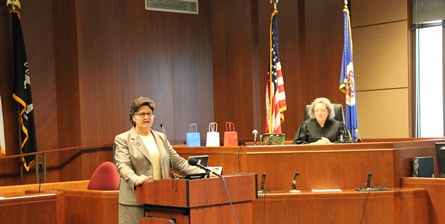News Item
Ramsey County Veterans Treatment Court Celebrates First Graduates
Posted: Thursday, July 9, 2015
District court, county, and community leaders gathered at the Ramsey County Courthouse today to celebrate the first four graduates of the Ramsey County Veterans Treatment Court. This was the program’s first graduation ceremony since it was founded in December 2013.

Second Judicial District Chief Judge Teresa R. Warner (left) speaks at the graduation presided over by Second Judicial District Judge Judith M. Tilsen (right).
“Today’s graduates have proven they are ready to chart a new course in their lives thanks to their commitment and hard work,” said Ramsey County Attorney John Choi. “The Veteran’s Court is only possible through the support and collaboration of our many partners to help our veterans who have contact with our criminal justice system in Ramsey County. Through these efforts, we will improve public safety and justice outcomes for those who have served our country.”
The Ramsey County Veterans Treatment Court is a voluntary court program for veterans with chemical or mental health issues who have been charged with a crime in Ramsey County. Since the beginning of Veterans Treatment Court, 38 veterans have been accepted into the program. The program represents a collaborative effort of criminal justice stakeholders working together in a non-adversarial setting to promote public safety and to help veterans involved in the criminal justice system break the cycle of substance abuse, mental illness, and criminal behavior.
The Court provides veterans with the opportunity to change life circumstances, become alcohol and drug free, and get treatment for mental health issues. This is accomplished through comprehensive assessment and treatment (chemical and mental health), intensive supervision, random drug and breath testing, regular court appearances, and immediate sanctions and incentives. Honesty and individual accountability are at the foundation of the program.
All participants in the program are assigned a volunteer veteran mentor. The role of the volunteer veteran mentor is to act as a coach, a guide, a role model, and an advocate for the individuals he or she will work with. The mentor encourages, guides, and supports the participant as she or he progresses through the Veterans Treatment Court program.
The program is a minimum of nine months for misdemeanor participants and a minimum of 12 months for gross misdemeanor and felony participants. The program is divided into three phases. Movement through phases is based on accomplishment of goals and requirements. Advancement through the phases results in reduced responsibilities and, ultimately, graduation from the program.
By providing justice-involved veterans with a coordinated substance abuse and mental health intervention plan, coupled with judicial oversight, the likelihood of re-arrest for any new offense decreases, resulting in safer communities, more stable families, and reduction in crime.
“The Ramsey County Veterans Treatment Court is focused on helping veterans with the treatment and services they need and deserve, while holding them accountable for their actions and their recovery,” said Second Judicial District Chief Judge Teresa R. Warner. “Today’s graduation ceremony is an excellent opportunity to celebrate and honor the hard work done by the veterans graduating from the Ramsey County Veterans Treatment Court. It is also an opportune time to acknowledge and thank the community and criminal justice stakeholders who have worked to make the Ramsey County Veterans Treatment Court a success.”
State and national studies of veterans’ courts and other drug court programs have shown their effectiveness at reducing recidivism and justice system costs, while improving outcomes for offenders who enter the programs. A 2012 statewide evaluation, comparing over 500 drug court participants to nearly 650 offenders with similar profiles who did not enter a drug court program, showed that drug court participants:
- Had lower recidivism rates over 2.5 years.
- Spent fewer days incarcerated, saving the state, on average, $3,200 per participant over two-and-a-half years.
- Showed gains in employment, educational achievement, home rental or ownership, and payment of child support over the run of the program.
In 2014, the Minnesota Judicial Branch released a follow-up to that 2012 evaluation, which tracked the progress of the same drug court participants and similar offenders over an additional year-and-a-half. The new evaluation found that drug court participants – now four years removed from their entry into a drug court program – continued to show significantly lower recidivism rates and reduced incarceration costs.
The Ramsey County Veterans Treatment Court is a collaborative effort involving Minnesota’s Second Judicial District, the Ramsey County Attorney's Office, the Ramsey County Veterans Services Office, Ramsey County Community Corrections, the St. Paul City Attorney's Office, the Ramsey County Public Defender's Office, Project Remand, the U.S. Department of Veterans Affairs, Ramsey County Human Services, and other community partners.
About Minnesota’s Second Judicial District
The Second Judicial District Court (Ramsey County) is a unified trial court with general jurisdiction to hear all types of civil and criminal cases. The Court has a total of 29 judges, four referees, and two magistrates. The main courthouse is located in downtown St. Paul, and a suburban court site is located in the City of Maplewood.